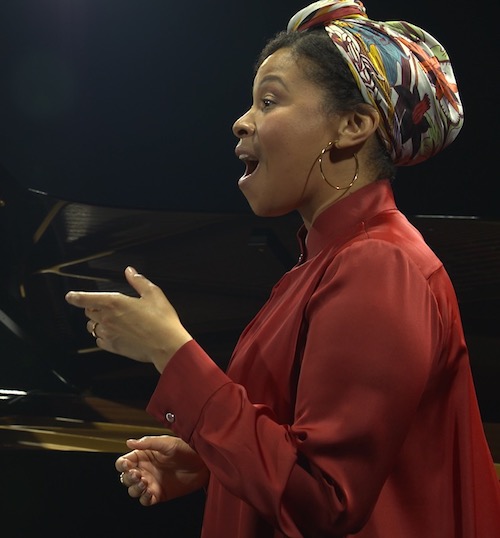Golda Schultz kicks off Vocal Arts’ virtual fall with women composers

Soprano Golda Schultz opened Vocal Arts DC’s virtual fall season with a program devoted to songs by women composers.
Vocal Arts DC is among those classical music presenters not yet returning to in-person performances. The group announced this month that it would continue to present its song recital series, the best in the city, through high-quality video recording this fall. In January, invited artists will begin performing live again in the Kennedy Center Terrace Theater.
The season opened this week with a streamed recital by South African soprano Golda Schultz and pianist Jonathan Ware, songs composed exclusively by women, recorded in a studio in Berlin, Germany.
Schultz plied her light lyric voice to an opening set of three Clara Schumann songs, with strong German diction. The legato line could be a little choppy, which was a deficit in the first two songs, “Liebst du um Schönheit” and “Warum willst du and’re fragen?” Ware matched the sensitive rubato Schultz added to these songs and gave an active edge to the roiling piano part in the last song, “Am Strande.”
This was followed by two songs by Emilie Mayer (1812-1883), a pianist who undertook composition studies with Friedrich Loewe after the tragic death of her father when she was 28. Although in the last decades of her life Mayer produced multiple symphonies, works of chamber music, and an opera, she was not even included in the 1980 edition of the New Grove Dictionary of Music and Musicians. Based on these selections, songs were not her best suit, although Schultz made the most of their pleasing melodic lines.
This has been a year of discovery when it comes to British-American composer Rebecca Clarke, whose music graced recitals from both Emily D’Angelo and Laura Choi Stuart in April. Schultz’s sweet, demure voice was wholly charming and extremely effective in delicate songs, like the tender “Cradle Song” and Clarke’s version of “Down by the Salley Gardens,” accompanied by meandering, surprising harmonies from Ware at the keyboard.
Clarke’s ominous setting of William Blake’s “The Tiger” proved a major discovery, with Ware making the most of the menacing chromatic lines and thundering tremolos that set the stage for the wide-eyed poetry. In a similar vein, Schultz’s tense declamation in music made “The Seal Man” the creepy legend that it is, about a hybrid creature probably based on the selkie that seduces a woman and drowns her.
This song paired cleverly with two songs about legendary female creatures that lure people to their deaths. Clara Schumann used agitated repeated notes in her song “Lorelei” that recalled Schubert’s “Erlkönig.” Schultz ventured into the higher parts of her range in this piece, giving the horror of the words added punch. The melodic, harmonic, and textural content of Emilie Mayer’s setting of “Erlkönig” was even more derivative of Schubert’s famous song, although with chromatic motifs instead of repeated notes.
Schultz and Ware saved the best for last, first with a set of stunning songs by Nadia Boulanger. The lovely “Cantique” and “Elégie” played again to the expressive, reflective strengths of Schultz’s voice. “Prière” took her into the highest territory up to that point in the recital, and she handled the high A, A-flat, and G demands beautifully. The best was “La mer est plus belle,” set to the gorgeous poetry of Paul Verlaine, a dulcet homage to the power and tenderness of the sea.
The final set was a new mini-cycle by Kathleen Tagg, a fellow South African, set to words by Lila Palmer, a brutal, honest sampling of a woman’s perspective on married life and motherhood. Tagg, also a pianist, used some preparations and extended techniques in the accompaniment, such as a bass ostinato on a stopped string in the first song, “After Philip Larkin.” This hollow thudding sound heightened the tension of Schultz’s vocal line.
Ware created magical effects with Tagg’s other techniques, such as glissando on the strings inside the piano case. At one point in “Single Bed,” Ware added a ghostly, harp-like countermelody to Schultz’s voice by plucking strings inside the piano. A more percussive effect came from a louder pluck of one string for rhythmic effect in the pulsating texture of the final song, “Wedding.” Schultz ventured up to a high B at the climax of the central song, a howl of indignation.
The video included brief conversations with Schultz and sometimes Ware, but having them after each set, including two single songs, was far too much interruption. Most interesting was the chance to hear how Schultz experienced the career interruption of the pandemic. Likening it to the film The Day the Earth Stood Still, she said the lockdown not only canceled her performances but her practicing and preparation, as upcoming projects dried up.
At the same time, this forced break gave Schultz a chance to think about what sort of art she wanted to make. This program of women composers, she said, had been rejected by many presenters, leading her agent, for example, to suggest adding some men to the program. The pandemic, for all its negative effects, steeled her will to stand behind the program. Listeners will be all the better for that.
Vocal Arts DC presents baritone Joshua Hopkins and pianist Myra Huang in a streamed recital October 8 to 19. vocalartsdc.org; 202-669-1463


